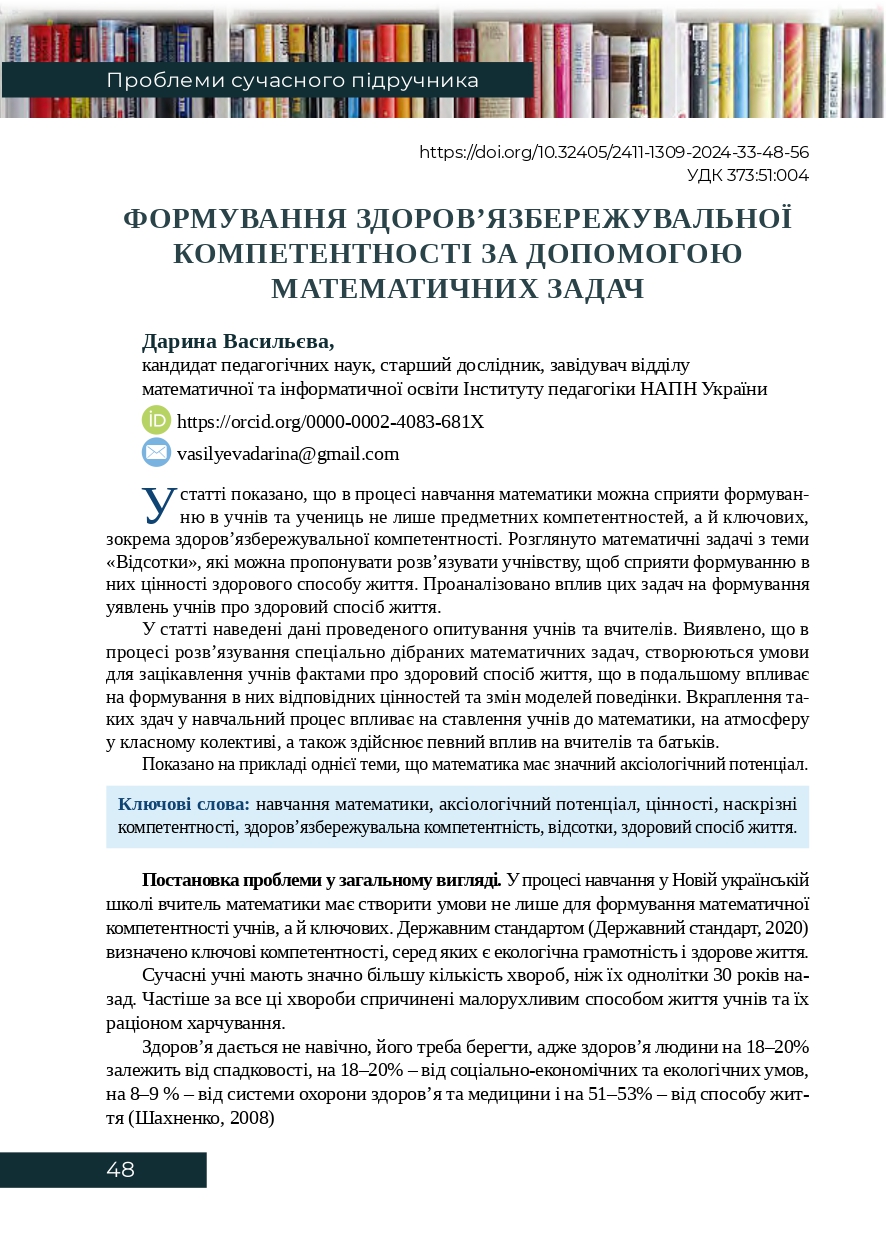FORMATION OF HEALTH-PRESERVING COMPETENCE THROUGH MATHEMATICAL PROBLEMS

Published 2024-12-31
Keywords
- teaching mathematics,
- axiological potential,
- values,
- cross-cutting competencies,
- health competence
- percentages,
- healthy lifestyle ...More
How to Cite
Copyright (c) 2024 Дарина Васильєва

This work is licensed under a Creative Commons Attribution-NonCommercial-ShareAlike 4.0 International License.
Abstract
The article shows that in the process of teaching mathematics, it is possible to promote the formation of not only subject competencies, but also key competencies, in particular, health competencies. The article considers mathematical problems on the topic of “Percentages” that can be offered to students to help them form the value of a healthy lifestyle. The influence of these tasks on the formation of students’ ideas about a healthy lifestyle is analyzed.
The article presents data from a survey of students and teachers. It is found that in the process of solving specially selected mathematical problems, conditions are created for students to become interested in facts about a healthy lifestyle, which further influences the formation of appropriate values and changes in behavioral patterns. Incorporating such activities into the educational process affects students’ attitudes toward mathematics, the atmosphere in the classroom, and has a certain impact on teachers and parents.
It is shown through the example of one topic that mathematics has a significant axiological potential.
Downloads
References
- Бурда, М.І. (2014). Компетентнісна спрямованість змісту шкільних підручників з математики. Проблеми сучасного підручника, 14, 78‒85.
- Бевз, В.Г. (2013). Реалізація аксіологічного підходу у підготовці майбутніх учителів математики. Дидактика математики: Проблеми і дослідження, 39, 7‒10.
- Васильєва, Д.В. (2015). Аксіологічний потенціал підручників з математики для основної школи. Проблеми сучасного підручника, 15, 150‒158.
- Державний стандарт базової середньої освіти. (2020) https://www.kmu.gov.ua/npas/pro-deyaki-pitannya-derzhavnih-standartiv-povnoyi-zagalnoyi-serednoyi-osviti-i300920-898
- Файчук, О. Л. (2011). Формування здорового способу життя особистості: історико-теоретичний аспект. Наукові праці. Серія: Педагогіка, 153(141), 89‒92.
- Allen, P. M., & Varga, L. (2007). Complexity: the coevolution of epistemology, axiology and ontology. Nonlinear Dynamics, Psychology, and Life Sciences, 11(1), 19.
- Dauyenov, Y., Zhumataeva, E., & Orynbekov, A. (2022). Methodological framework for the axiological paradigm in the learning environment. Frontiers in Education, 7. https://doi.org/10.3389/feduc.2022.895470
- Ernest, P. What is the philosophy of mathematics education? https://education.exeter.ac.uk/research/centres/stem/publications/pmej/pome18/PhoM_%20for_ICME_04.htm
- Jumanovich, T. A., & Eshboevna, T. D. (2019). Features of basic methodological approaches in pedagogy. EJRRES, 7, 702–705.
- Shahnenko, V.I. (2008) Preparation of students for leading a healthy lifestyle in the content of health-promoting courses in independent schools of Ukraine. Pedagogy, psychology, and medical-pedagogical issues of physical education and sport, 1, 167–175.
- Allen, P. M., & Varga, L. (2007). Complexity: the coevolution of epistemology, axiology and ontology. Nonlinear Dynamics, Psychology, and Life Sciences, 11(1), 19. (in English).
- Bevz, V.H. (2013). Realizatsiia aksiolohichnoho pidkhodu u pidhotovtsi maibutnikh uchyteliv matematyky. Dydaktyka matematyky: Problemy i doslidzhennia, 39, 7‒10. (in Ukrainian).
- Burda, M.I. (2014). Kompetentnisna spriamovanist zmistu shkilnykh pidruchnykiv z matematyky. Problemy suchasnoho pidruchnyka, 14, 78‒85. (in Ukrainian).
- Dauyenov, Y., Zhumataeva, E., & Orynbekov, A. (2022). Methodological framework for the axiological paradigm in the learning environment. Frontiers in Education, 7. https://doi.org/10.3389/feduc.2022.895470 (in English).
- Derzhavnyi standart bazovoi serednoi osvity. (2020) https://www.kmu.gov.ua/npas/pro-deyaki-pitannya-derzhavnih-standartiv-povnoyi-zagalnoyi-serednoyi-osviti-i300920-898 (in Ukrainian).
- Ernest, P. What is the philosophy of mathematics education? https://education.exeter.ac.uk/research/centres/stem/publications/pmej/pome18/PhoM_%20for_ICME_04.htm (in English).
- Faichuk, O. L. (2011). Formuvannia zdorovoho sposobu zhyttia osobystosti: istoryko-teoretychnyi aspekt. Naukovi pratsi. Seriia: Pedahohika, 153(141), 89‒92. (in Ukrainian).
- Jumanovich, T. A., & Eshboevna, T. D. (2019). Features of basic methodological approaches in pedagogy. EJRRES, 7, 702–705. (in English).
- Shahnenko, V.I. (2008) Preparation of students for leading a healthy lifestyle in the content of health-promoting courses in independent schools of Ukraine. Pedagogy, psychology, and medical-pedagogical issues of physical education and sport, 1, 167–175. (in English).
- Vasylieva, D.V. (2015). Aksiolohichnyi potentsial pidruchnykiv z matematyky dlia osnovnoi shkoly. Problemy suchasnoho pidruchnyka, 15, 150‒158. (in Ukrainian).
